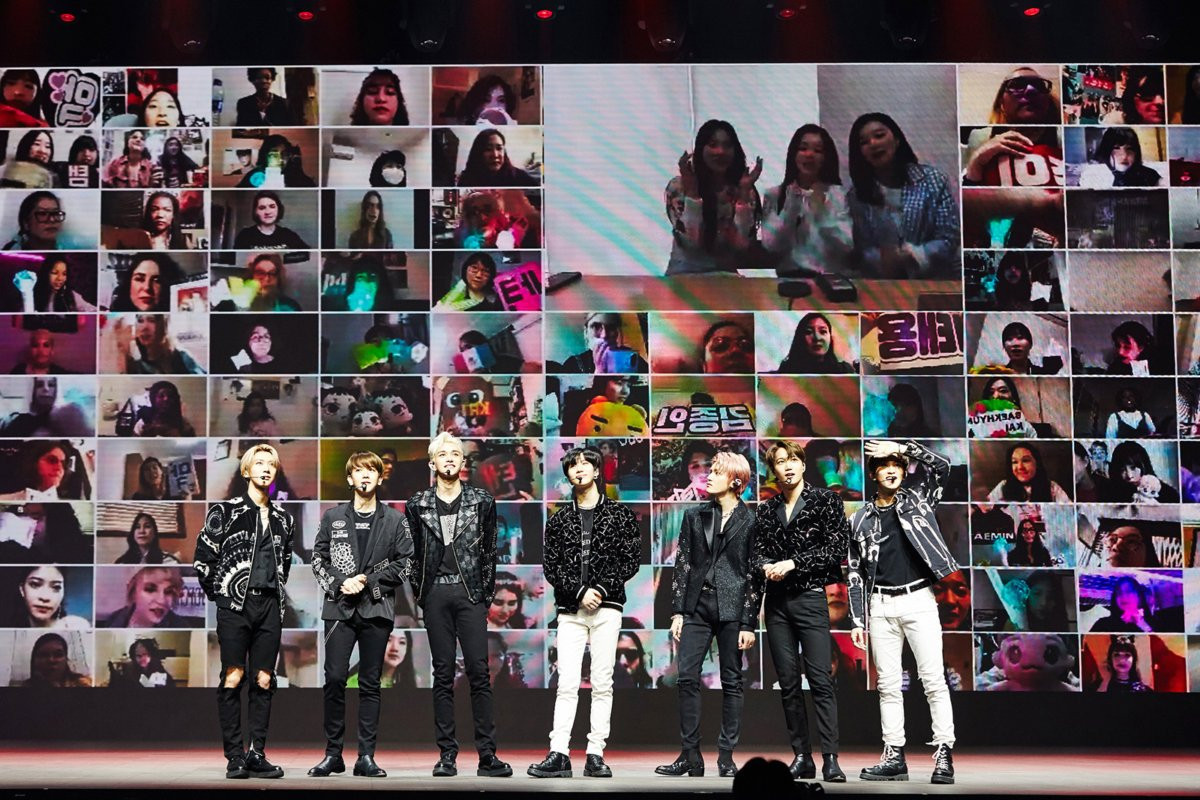Popular Reads
Top Results
Can't find what you're looking for?
View all search resultsPopular Reads
Top Results
Can't find what you're looking for?
View all search resultsWill virtual concerts replace offline tours?
When the coronavirus epidemic first struck South Korea, many expected the K-pop scene to take a major financial blow. Tours worldwide got postponed, long-awaited new music releases were delayed, showcases canceled.
Change text size
Gift Premium Articles
to Anyone
W
hen the coronavirus epidemic first struck South Korea, many expected the K-pop scene to take a major financial blow. Tours worldwide got postponed, long-awaited new music releases were delayed, showcases canceled. According to the Record Label Industry Association of Korea, a total of 211 concerts were canceled from February to April, accruing losses of almost 63.32 billion won ($51.6 million).
But as in any crisis, artists and their labels found ways to adjust and not only came up with innovative ways to trudge through the hardships, but may even have found new sources of revenue.
S.M. Entertainment teamed up with search engine Naver last month and launched a concert-streaming service called Beyond Live, advertising it as “the beginning of a new performance culture.”
Though concerts had been livestreamed before -- one example is BTS’ Wembley show, made available to paying subscribers last year on Naver’s V Live -- Beyond Live goes beyond broadcasting offline concerts and provides concert content specifically optimized for the online environment.
For instance, AR and 3D technologies allow holographic tigers to prance onstage or a holographic plane to fly overhead. Artists chat with their fans in real time between performances, while fans wave digital light sticks as they would in an arena.
The two-hour premiere on April 26 featuring SuperM was enjoyed by 75,000 people across 109 countries, according to S.M. As each ticket costs 33,000 won, ticket sales are estimated to bring in 2.5 billion won. Considering that midsize stadiums can generally accommodate up to 10,000 people, virtual concerts with no such limitations have the potential to emerge as a new business model for entertainment companies.
On Monday the firm added two more groups to the lineup, TVXQ and Super Junior. NCT 127, set to perform this Sunday, will use the livestreamed concert to premiere its songs “Punch” and “Make Your Day” from the band’s second full-length repackaged album, which won’t be released until Tuesday.
“These livestream concerts were introduced due to the current virus outbreak, but I believe they will go on even after the epidemic dies down,” said Hwang Jeong-gi, head of entertainment agency JG Star Entertainment.
“Bigger firms might develop their own platforms, whereas small or midsize companies can partner with existing or new livestream platforms. If you look at app stores, there are so many broadcast apps popping up these days. Since it’s not easy for artists to perform abroad, labels hope to reap benefits if they build a foundation early on to telecast domestic concerts for international fans.”
Read also: BTS announces live virtual concert on June 14
Big Hit Entertainment, home to the likes of BTS and TXT, may be the most social media-savvy K-pop label. While the firm smartly uses popular platforms such as Twitter, YouTube and TikTok, it also distributes exclusive content via its own membership-based platform, Weverse.
In March it launched a series of Korean language-learning videos, called “Learn Korean With BTS”, and this week it will put out a new documentary series titled Break the Silence, which looks back on BTS’ Love Yourself World Tour from 2018 and 2019.
The highlight is “Bang Bang Con” series that started last month. To make up for the postponement of BTS’ Map of the Soul Tour, the label aired footage from the band’s past shows for free for two days on the BangtanTV YouTube channel.
In addition, it announced Thursday the launch of an online live concert, “Bang Bang Con The Live” to be held on June 14 via pay-per-view on Weverse. Big Hit said it will offer a “multi-view BTS concert experience right in the home of each and every Army (the band's official fandom).”
The previous livestream attracted over 50 million viewers, with 2.24 million reportedly watching at its peak. Many fans lit up their virtual light sticks using Weverse to show their support, and expressed excitement about being able to spend the weekend with the band and others around the world in the BTS Army, even if it was only online.
Despite several new and innovative experiments underway to fight the protracted uncertainties, many industry watchers are still skeptical about whether these virtual concerts can replace offline tours in the long run.
“One of the critical factors for a concert is the atmosphere, especially for performance groups. But even with AR technology, I couldn’t feel a lot of real commotion. It didn’t feel much different from watching their music videos on YouTube,” said music critic Jung Min-jae.
He predicted that virtual concerts and related new technologies would play a role in spicing up offline concerts once world tours resumed.
“Perhaps bands can host the finale online or carry out livestreams with actual concerts to accommodate fans who can’t attend or cities they can’t visit.”
This article appeared on The Korea Herald newspaper website, which is a member of Asia News Network and a media partner of The Jakarta Post











